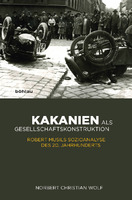Kakanien als Gesellschaftskonstruktion
Robert Musils Sozioanalyse des 20. Jahrhunderts
Author(s)
Wolf, Norbert Christian
Collection
Austrian Science Fund (FWF)Language
GermanAbstract
This monograph (professorial dissertation FU Berlin 2009) undertakes an interpretation of the entirety of Musil's monumental novel by placing the focus on its socio-analytical critique of contemporary society. It adapts Pierre Bourdieu's concept of the socio-analysis of literary texts, complemented by methodology from recent narratology, discourse and media theory, and is empirically grounded upon research from social and cultural history. Opening with a reconstruction of Musil's 'negative' anthropology and his concurrently analytical and constructivistic conception of the novel, as well as his essayistic, 'anti-filmic' poetics, the first part of the study profiles the socio-analytical implications of two major terms of his concept of the novel: firstly "Eigenschaftslosigkeit" (lack of inherent qualities or characteristics), and secondly "Möglichkeitssinn" (sense of possibility) or "Essayismus" (essayism). The main section of the study continues with a reading of The Man without Qualities as a social 'force field', beginning with an analysis of the narratively constituted chronotope and the social sphere of Kakania. It then turns to the central male and female figures of the novel (in the sections Heirs and Disinherited; Climbers and Stagnaters; Terrorists and Prophets, as well as Fallen Lovers; Sufferers of an 'obscure time-disease'; Adapters and Dissidents) and finally to the constellations and interactions of the characters in their aesthetic arrangements (in the sections Marriages in Crises; Orderless Circumstances, Gender Struggle; Attempts at Love beyond Marriage; and Rivalry over Principles and People; Ideologic Hostilities and Class Struggle). Special attention is paid to Musil's contemporary critique of a society in a contradictory process of modernisation, and to his concrete historical and ideological points of reference in the conflict strewn Austria and Germany of the preand inter-war years, as it is these to date neglected aspects that cause the uncompleted, and yet epoch-making, novel to appear so unique and incomparable. A final section considers the positioning of the novel and ist author in the contemporary literary field, as well as his indirect authorial self-analysis which occurs in a concealed manner throughout the fictional narration. With this socio-analysis of The Man without Qualities, Bourdieu's innovative cultural-sociological approach is for the first time applied in a consistent and detailed manner on a canonical German language novel. Moreover, an integral aspect of the study involves a theoretically aware integration of meticulous textual analysis and a broad cultural and literary historical contextualisation, which not only extends over Musil's essays and his voluminous literary remains (notes and drafts of sequels), but also over numerous discoursive involvements with contemporary Austrian and German politics and scholarship, and national and international literature. The Man without Qualities hence is presented as a modern classic of European literature, which relentlessly reveals the roots of the catastrophical history of the early twentieth century, and which transcends the sociological knowledge of its time. Die Monographie (Habilitationsschrift FU Berlin 2009) unternimmt eine integrale Gesamtinterpretation von Musils monumentalem Roman mit dem Fokus auf dessen zeithistorische bzw. gesellschaftsanalytische Leistung. Sie stützt sich unter anderem auf Pierre Bourdieus Konzept einer Sozioanalyse literarischer Texte, das für literaturwissenschaftliche Zwecke adaptiert, durch Anleihen aus der neueren Erzähl-, Diskursund Medientheorie ergänzt sowie durch Befunde der Sozial- und Kulturgeschichtsschreibung empirisch gesättigt wird. Ausgehend von einer Rekonstruktion der ‚negativen' Anthropologie Musils, seiner gleichermaßen analytischen und konstruktivistischen Romankonzeption sowie seiner essayistischen, ‚antifilmischen' Poetik werden im ersten Teil der Untersuchung mit der "Eigenschaftslosigkeit" und dem "Möglichkeitssinn" (bzw. dem ‚Essayismus') zunächst zwei Grundbegriffe des Romankonzepts auf ihre sozioanalytischen Implikationen hin profiliert. Darauf folgt im Hauptteil der Arbeit die Lektüre des Romantextes als gesellschaftliches Kräftefeld, d.h. zunächst eine Analyse des erzählerisch konstituierten Chronotopos und ‚sozialen Raumes' Kakanien, sodann der zentralen männlichen und weiblichen Figuren des Romans (in den Abschnitten Erben und Enterbte; Aufsteiger und Gebremste; Terroristen und Propheten sowie Gefallene Geliebte; Leidende an einer ‚geheimnisvollen Zeitkrankheit'; Angepasste und Dissidentinnen) und zuletzt der figuralen Konstellationen und Interaktionen in ihrer künstlerischen Gestaltung (in den Abschnitten Ehen in der Krise; Unordentliche Verhältnisse, Geschlechterkampf; Liebesversuche jenseits der Ehe sowie Konkurrenz um Prinzipien und Menschen; Ideologische Gegnerschaften, Klassenkampf). Musils zeitkritischer Diagnose einer im widersprüchlichen Modernisierungsprozess befindlichen Gesellschaft und seinen konkreten historischen bzw. ideologischen Bezugspunkten in der konfliktreichen österreichischen und deutschen Vor- und Zwischenkriegszeit gilt dabei ein besonderes Augenmerk, sind es doch gerade auch diese bisher weniger beachteten Aspekte, die den epochalen Romantorso so einzigartig und unvergleichlich erscheinen lassen. Ein abschließender Teil beschäftigt sich mit der Stellung des Romans und seines Autors im zeitgenössischen literarischen Feld sowie mit dessen indirekter schriftstellerischer Selbstanalyse, die auf versteckte Weise im Medium des fiktionalen Erzähltextes erfolgt. Mit der hier unternommenen Sozioanalyse des Mann ohne Eigenschaften wird Bourdieus innovativer kultursoziologischer Ansatz erstmals in dieser Konsequenz und Ausführlichkeit auf einen kanonischen deutschsprachigen Roman angewendet. Eine Besonderheit der Untersuchung besteht außerdem in der theoriegeleiteten Integration genauer Textanalysen und einer breiten kultur- und literaturgeschichtlichen Kontextualisierung, die sich nicht nur auf Musils Essays und seinen umfangreichen Nachlass (Notizen und Fortsetzungsentwürfe), sondern auch auf zahlreiche diskursive Zusammenhänge mit der zeitgenössischen österreichischen und deutschen Politik und Wissenschaft sowie der deutschsprachigen und internationalen Literatur erstreckt. Der Mann ohne Eigenschaften wird somit als moderner Klassiker der europäischen Literatur lesbar, der die Wurzeln der Katastrophengeschichte des frühen 20. Jahrhunderts schonungslos offen legt und dessen kritische Befunde weit über den sozialwissenschaftlichen Kenntnisstand seiner Zeit hinausweisen.
Keywords
Robert Musil; The Man without Qualities; modern novel; sociology of the novel; Pierre Bourdieu; cultural historyDOI
10.26530/oapen_437166ISBN
9783205787402OCN
952493531Publisher
BrillPublisher website
https://brill.com/Publication date and place
2011Grantor
Imprint
BöhlauClassification
Society and Social Sciences


 Download
Download